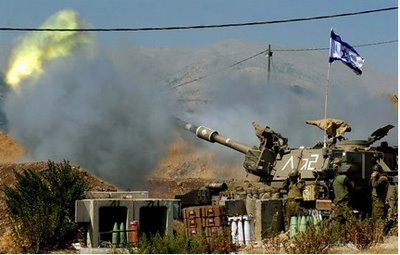
July 12, 2006
Israeli Forces Enter Lebanon After 2 Soldiers Are Seized
JERUSALEM, July 12. With two more soldiers captured today, Israel launched a major military offensive on a second front, sending armored forces into southern Lebanon in response to a brazen border raid by the militant group Hezbollah that killed at least seven soldiers in addition to those abducted.
The new Israeli incursion came on a day when the army was still expanding its two-week-old operations in the Gaza Strip, seeking the return of a soldier captured by Palestinian militants inside Israel on June 25. More than 20 Palestinians were killed by Israeli artillery in Gaza today according to Palestinian medical officials.
Israel has overwhelming military superiority in both southern Lebanon and Gaza. Hezbollah and the militant Palestinian faction Hamas both have leverage in the form of the captured Israeli soldiers, raising the possibility that the dual confrontations could carry on indefinitely.
Israel is demanding that all three of its soldiers be returned unconditionally and that the militant groups stop firing rockets at Israel civilians from Gaza in the south and Lebanon in the north.
But with the Israeli soldiers in hand, Hamas and Hezbollah say the only solution is an exchange for a large number of Palestinian and other Arab prisoners held by Israel.
The Hezbollah leader, Sheik Hassan Nasrallah, suggested the possibility of a package deal.
"The capture of the two soldiers could provide a solution to the Gaza crisis," Sheik Nasrallah said in Beirut. The operation had been planned for months, he said, though he added, "the timing, no doubt, provides support for our brothers in Palestine."
Two years ago, Hezbollah managed to win freedom for more than 400 Palestinian and Lebanese prisoners in exchange for an Israeli businessman held in Lebanon and the corpses of three Israeli soldiers killed in a Hezbollah attack along the border in 2000.
The Lebanese government said little after the fighting broke out. Hezbollah effectively controls Lebanon's southern border despite international pressure and a United Nations resolution calling on the Lebanese government to take control of its borders and disarm militia groups.
The United Nations representative to southern Lebanon, Gier Pedersen, condemned Hezbollah's capture of the Israeli soldiers, calling it "an act of very dangerous proportions."
Today's fighting erupted around 9 a.m. when Hezbollah attacked several northwestern Israeli towns with rocket fire, injuring several civilians, the Israeli military said. Israeli civilians rushed into their bomb shelters and many remained there throughout the day.
But that attack was a diversion for the main operation, several miles to the east, where Hezbollah militants fired anti-tank missiles on two armored vehicles patrolling the Israeli side of the border fence, the military said.
Of the seven soldiers in the two vehicles, three were killed, two were wounded and two were abducted, the military said.
Israel then responded with artillery fire, airstrikes and a naval bombardment that targeted some 40 sites in southern Lebanon. Most were believed to be Hezbollah strongholds, but roads and bridges were also hit in an attempt to keep Hezbollah from moving the captured soldiers further to the north, according to the military.
Israel also sent ground forces into Lebanon, and a tank hit a powerful explosive planted in the road, killing all four soldiers inside, the Israeli military said.
With a total of seven soldiers killed, it was one of the deadliest days for the Israeli forces in several years.
The Israeli incursion was the first such operation in southern Lebanon since Israel pulled its troops back into Israel in 2000, ending two decades of occupation.
While cross-border shooting exchanges are still common, it has been exceedingly rare for Hezbollah and the Israeli military to come face-to-face on the ground over the past six years.
Residents in Beirut's southern suburbs, which are dominated by Shiites, handed out sweets and set off firecrackers in celebration as word spread that the Israeli soldiers had been captured.
In the past, Hezbollah has attacked Israel at moments when there was already heavy fighting between the Israelis and the Palestinians. Hezbollah says it acts out of solidarity with the Palestinians, and the timing also creates additional problems for Israel.
Greg Myre reported from Jerusalem for this article and Steven Erlanger from Gaza City for the New York Times.

No comments:
Post a Comment